Archive
You are currently browsing the archives for the Zambia category.
By ewbexec
While we were all on break from school, things in Zambia certainly haven’t been quiet! Following the death of Michael Chilufya Sata last October, Zambia held elections for a new president a few weeks ago. On January 24, our partner community elected Edgar Lungu, the candidate from the Patriotic Front party, to be their new leader.
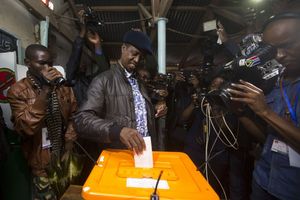
Elections were quite a challenge this year. Voting started on January 20, but it continued for four days, due to rain and other logistical issues that interfered with voting in many parts of Zambia. As many as 160 polling stations were unable to open due to weather issues, hurting voter turnout. To make matters worse, because Zambia has had so many parliamentary elections lately, many citizens have simply grown weary of voting and thus did not come out for the election. As a result, only 32.36 percent of eligible voters voted in this election. Additionally, issues have persisted even after the elections. Because Lungu only won with 48.3 percent of the vote, his victory is being contested. Hakainde Hichilema, leader of the United Party for National Development (UPND), received 46.7 percent of the vote, and he and some of his supporter believe that the election was unfair or even rigged. Hichilema spoke out against violence towards his supporters, and he also stated that there were “irregularities” in the counting process. He has called for voting reform in Zambia, and he continues to be a strong contender in the next election, which will take place in 2016.
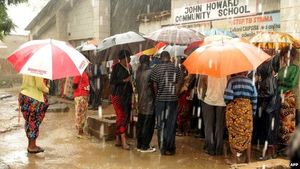
Political conflict has some potential to disrupt the work that we are trying to do in Zambia. However, because Lungu is from the same party that Sata represented, policy may not change too radically. Additionally, we deal largely with local government and NGOs when we work in Zambia, and those will probably be less affected than the nation as a whole. The SADC gave the election their stamp of approval, saying that the voting happened peacefully, so it is unlikely that they will struggle with the new power. However, strong political disagreements may lead to some unrest in our partner community, and we, as always, must continue to put in extra effort to be sensitive and respectful towards the politics of the people that we are trying to help. In any case, we will continue in our mission to help the people of Naluja, despite any new challenges or changes that this election might bring.
By ewbexec
Guest Blog Writer: Abigail Rendos, Secretary-elect
Global health improvement: three powerful words that embody EWB USA’s main goal and our focus, as EWB’s BU student Chapter, while we work towards improving health standards in Zambia. Often, these goals become a guideline of our responsibilities as BU engineers as we attempt to better the lives of those in our partner community by developing and implementing sustainable engineering designs. One of our main initiatives within the field of global health is a project aimed at increasing the quality of cell signal in Naluja, Zambia. Our Yagi Antenna, in partnership with CGHD’s Project Mwana, serves to expedite the delivery of newborn HIV test results through SMS text messages to the new mothers of the community. By hastening this process, more mothers will be able to take the measures necessary to ensure the health of their children during the critical stages of infancy.
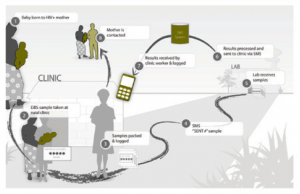
Flow chart explanation of SMS text notification process
(Image from Frog Design For United Nations Children Fund)
These efforts are meant to help the locals of Naluja and to serve as an example for other communities as they also try to combat the prevalence of HIV using m-Health initiatives. Much of the health concern in Zambia revolves around the passing of HIV from mother to infant, which accounts for 21% of HIV contraction in Zambia overall (Steidenberg). Giving an expectant mother anti-viral medication can help prevent them from transferring the disease to their children, but if the infant does contract the disease, we hope that our antenna will ensure the infant starts receiving treatment as soon as possible. Early detection decreases the rate of mortality later in life, thereby increasing the standard of living for people with HIV/AIDS. It is a great way to positively impact lives in Zambia, as much of Africa is attempting similar programs to help lessen the impact of HIV. That is why we, within our EWB-BU chapter, are so excited for the progression of the Yagi Antenna project and are looking forward to bettering our current model during our upcoming Summer 2014 trip to Naluja!
A promising study conducted by the United Nations in multiple African countries shows a huge decrease in infant contraction of HIV/AIDS in recent years. Among others, Zambia “reported reductions of at least fifty percent” since 2009 (Stuart). This is an amazing feat for these countries whose main health concern has been HIV/AIDS for many years because of the inability to completely treat an infected person. Even more surprisingly, Ghana reported a 76% reduction of HIV in infants. These are breakthrough statistics for countries in Africa, as they set a great example for other developing regions struggling to prevent the spread of infectious diseases.
Even more encouraging is the use of a similar text message program by the World Health Organization, which has been implemented in other countries and regions of Zambia (Thea). The WHO’s use of text message transmission reassures our organization that the work we do does have an impact on our partner community and has the potential to change statistics. We hope our progress with the antenna in Zambia will help improve the chances of even more children surviving HIV and further reduce the amount contracting the disease in the first place. Global health improvement is at the core of our organization and is an integral part of increasing the standard of living for the people in Naluja.
Works Cited
Steidenberg, Phil, Donald Thea, Stephen Nicholson, Merrick Schaefer, Katherine Semrau, Maximillian Bweupe, Noel Masese, Rachael Bonawitz, Lastone Chitembo, and Caitlin Goggin. (n.d.): n. pag. World Heath Organization. WHO, 15 Mar. 2012. Web. 13 Mar. 2014.
Stuart, Elizabeth. "How to Achieve an AIDS Free Generation? Ghana Has a Few Ideas." Global Post. Global Post-International News, 6 Dec. 2013. Web. 13 Mar. 2014.
By ewbexec
Entering the new year of 2014 has given us a chance to re-evaluate the progress of our student chapter and development of our program in Naluja, Zambia. Recounting the successes of 2013, we were fortunate to send a travel team to Zambia during the month of August in order to implement the Cell Phone Signal Amplification project. During that trip, we were also able to complete an assessment for the water filtration system we are working on, as well as strengthen the bond with our many friends in Naluja, Zambia. We have made great strides in project development and growing our student chapter at Boston University. It has been a time of more learning, planning, and building as we look forward to another potential trip during the summer of this year.
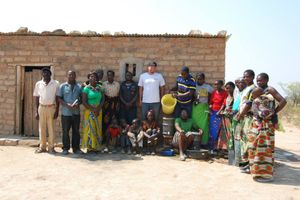 The preparation necessary for another trip involves more thorough project prototyping, development of education manuals for local villagers, correspondence with our NGO partners on the grounds (ZCHARD), day-to-day itinerary, equipment management, lodging, and much more. All these steps are necessary for a smooth and successfully trip. However, the two most important that come to mind are project development at BU and raising funds for sending students and mentors to Zambia. The first is essential for effectively installing the most sustainable and cost-efficient design for any particular project we are working on. Our goals for this next trip are to implement the water filtration system, monitor and improve the Yagi Antenna that was implemented last year, and continue to collaborate with our partners on any additional projects such as undergoing a more thorough health assessment.
The preparation necessary for another trip involves more thorough project prototyping, development of education manuals for local villagers, correspondence with our NGO partners on the grounds (ZCHARD), day-to-day itinerary, equipment management, lodging, and much more. All these steps are necessary for a smooth and successfully trip. However, the two most important that come to mind are project development at BU and raising funds for sending students and mentors to Zambia. The first is essential for effectively installing the most sustainable and cost-efficient design for any particular project we are working on. Our goals for this next trip are to implement the water filtration system, monitor and improve the Yagi Antenna that was implemented last year, and continue to collaborate with our partners on any additional projects such as undergoing a more thorough health assessment.
The fundraising aspect of our organization is the second pillar that enables us to fulfill our goals and help bring development to the Naluja catchment in Zambia. With the ever-growing prices of airfare, gas, lodging, and project equipment it is always a struggle to raise the necessary funds for our trips. Therefore, we make it a priority to have fundraising events, such as Project Mailbox and our annual Silent Auction, to help with the allocation of funds for our projects and trip. Indeed, without the support from our large EWB family, comprised of several departments at BU, ZCHARD, partners, and members and their families – we would not be able to achieve all that we have done so far. Currently, we are in the midst of our Year-End Campaign – a season long effort to help our student chapter acquire the necessary funds to make this year’s trip possible and goals met. We are excited to embark on another journey of development and relations with our partners in Zambia, as we are sure that this year will also bring successes. Finishing the holiday season, we ask you to contribute to our campaign and joins us as we GEAR UP to finalize projects and plan a summer trip. Any small donation, letter of support, or technical advice has a significant impact, so we are more than happy for you to join our cause to help bring global health to some remote areas of Zambia!
Please feel free to read more on this campaign on our EWB-USA page and contact us with any questions!
By ewbexec
Hello everyone!
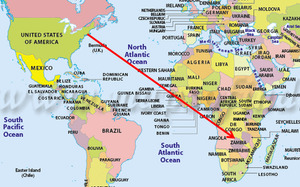 Our travel team has left for Zambia!
Our travel team has left for Zambia!
EWB-BU members Grace Wang, Declan Bowman, and Nathanael Lee, in addition to mentor Mohammed Jafri of the Boston Professional Chapter, left for our pre-assessment trip on August 13. They plan to come back on the 27th.
During the two weeks our team is in Zambia, there is a lot to get done! This is a pre-assessment trip, so our team will be looking to get a better understanding of Naluja, the community where our program has opened, and of its people. By sending our members to Zambia, we hope to pinpoint some of the problems the Naluja community is experiencing and start brainstorming projects that might be able to appease these needs.
One of the ways we'll be collecting data is through a Baseline Health Assessment, with which we'll try to explore the health-related challenges the community faces. Our team will be collecting information about the Naluja community through interviews with the residents and their own observations. We'll also be using data already compiled by Measure DHS and the Central Statistical Office of Zambia. If you'd like to take a look, check out the following links:
By the end, we hope to get a better sense about the needs of the community so we can figure out to best address them.
Check back on our blog soon for more updates about what we're doing in Naluja, Zambia!
We're really excited to be able to send members of EWB-BU to Zambia! The entire group has been working towards this goal for a very long time, so it's very exciting to see all the hard work come to fruition. Thank you to our members for helping us reach this point! We wish our travel team the best of luck in Zambia!
By ewbexec
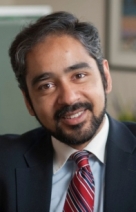 Hello everyone! Hopefully everyone has had a lovely spring break and are looking forward to the next couple of months before summer vacation.
Hello everyone! Hopefully everyone has had a lovely spring break and are looking forward to the next couple of months before summer vacation.
In recent news, check out the blog posts of Professor Muhammad Zaman, advisor to our BU chapter of Engineers Without Borders, on The Huffington Post! With titles such as "Make Development Part of the Equation" and "Engineering a Healthy Tomorrow for the Poorest Billions," Zaman looks at the greater context of engineering in today's world and the impact it can have on the lives of billions in the future. It's incredible, he says, that engineering has led to such technological innovations and accomplishments already, such as "sending the man on the moon and building bridges and buildings that defy imagination." Hopefully, continued imagination and creativity and hard work on the part of global engineers can continue this trend, with the focus of using engineering to better the lives of those in the poorest countries. While in recent years engineering programs have seen a decline in the number of applicants and interested individuals, this field has enormous implications for the future.
With the world's population over 7 billion people and growing at an exponential rate (http://ngm.nationalgeographic.com/7-billion), efforts must be made so that the poorest regions in the world are not held back, or regress, due to a disparity in resources and innovation and education, but instead are encouraged to progress and create the foundation for a healthy and sustainable future by investing in education and innovation. It is imperative that the conditions today in the poorest countries - including a lack of proper infrastructure, inadequate health services, etc. - not set the tone for the future. As Zaman says, "gone are the days when we accepted disease, suffering and poverty as the common lot of the poor." It is no longer acceptable to simply sit back on our laurels when there are issues that can be acted upon and situations that need to be changed. It's not an option to let such suffering continue. And engineers play a big part in ensuring that this idea of growth and progress, even in the poorest of countries, come to fruition in the future. Ultimately, everyone benefits from this investment in the future. "The creation of new knowledge and new paradigms to address the global problems will inevitable lead to discovery of new, cheaper and robust design criteria that will have an impact on all societies, including ours, here in the US."
And this is something that the BU chapter of Engineers Without Borders is working on. We hope that our project in Zambia, in partnership with the Center for Global Health and Development (CGHD) and the Zambia Center for Applied Health Research and Development (ZCAHRD), will help to contribute toward alleviating the current situation with HIV test results. For more information on our project, click the following link: http://people.bu.edu/ewbexec/Projects.html.
To read Professor Zaman's blog posts, click the following link: http://www.huffingtonpost.com/muhammad-h-zaman
By ewbexec
We've been horribly negligent in updating this, but we're back and ready to renew our blog's web presence. Hopefully, you haven't completely forgotten us 🙂
To get you up to speed:
We closed our project in Peru and are working to open a new program. Students from the BU School of Public Health continue to work with the community and were just finishing up some more health surveys this past spring. For our newest program, we've been building connections with clinics in the Mazabuka district of Zambia via the Center for Global Health & Development (CGHD) and its local representative the Zambia Center for Applied Health Research and Development (ZCAHRD).
CGHD has started a pilot program in these rural Mazabuka district clinics to speed up the transmission of infant HIV/AIDS test results from dried blot spot (DBS) tests. By using SMS messaging, 1-3 weeks of waiting time can be trimmed. This means a quicker turnaround for a treatment plan, and acts as an incentive for mothers to return to the clinics for post natal care while their test results are arriving. The problem is cell phone reception. Because the clinics are rural the reception is very weak and unreliable. If we could offer a method to increase the reception, this program would be much more successful and relevant.
We are extremely excited at the prospect of collaborating with ZCAHRD. However, we still need to work with EWB-USA to be sure our project matches their mission and gets approved. Until then, we cannot 'officially' start any work on a project.
While we continue to work through the red tape and talk with national, our technical lead, Saeed, has been working to find a mentor on our campus with knowledge of cell phone reception.
The next item on our agenda is to throw our Annual Silent Auction Reception. This will be held on Thursday, October 27 at 6 pm on Boston University's campus. We'd love to have all of our supporters turn out, so save the date!
Boston University-EWB Executive Board




 Our travel team has left for Zambia!
Our travel team has left for Zambia! Hello everyone! Hopefully everyone has had a lovely spring break and are looking forward to the next couple of months before summer vacation.
Hello everyone! Hopefully everyone has had a lovely spring break and are looking forward to the next couple of months before summer vacation.